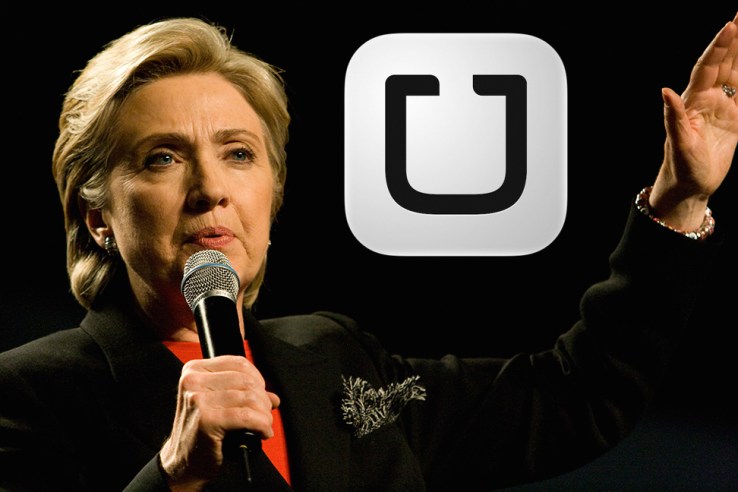
As if Uber needed more enemies. Presidential candidate Hillary Clinton will blast contractor-fueled companies for repressing middle-class wage growth in a speech tomorrow laying out her economic policies, according to an outline of the talk attained by Politico’s Michael Grunwald.
Read our follow-up on Clinton’s speech: Hillary Clinton Says On-Demand Economy Raises Hard Questions About Workplace Protections
[Update 7/13 5:45am PST: Clinton’s camp has since clarified to Politico that “she’ll cite sharing economy as example of wage pressure”, but not as aggressively as its post implied. To better express that, we’ve edited our headline from “Hillary Clinton Plans To Campaign Against Uber’s Contractor Economy.”]
Update 7/13 7:20am PST: In her speech, Clinton said that “this on-demand or so-called gig economy is creating exciting opportunities and unleashing innovation. But it’s also raising hard questions about workplace protections and what a good job will look like in the future”. She “vows to crack down on employers who misclassify workers as independent contractors”, which she says is “wage theft”. Clinton also said that benefits, paid sick leave, and maternity leave are essential to strengthening the middle class. Those are things independent contractors don’t get.]
Clinton plans to make raising middle class incomes a focus of her campaign, and will lay out her strategy at The New School in Manhattan on Monday. Along with globalization and automation, Clinton will peg the sharing economy as “conspiring against sustainable wage growth”, according to Politico. The report says “she will argue that policy choices have contributed to the problem, and that she can fix it.”
 The logic seems to be that if big job creators are only offering contractor positions that typically lack the benefits, advancement opportunities, and job security of full-time positions, they don’t contribute to building a country with sustainable wage growth. Before, full-time taxi drivers might have be able to rely on their future income to make investments in owning a home or putting a child through college. Full benefits might have protected them from downturns that could suddenly cripple a family’s socioeconomic mobility, like an expensive medical condition.
The logic seems to be that if big job creators are only offering contractor positions that typically lack the benefits, advancement opportunities, and job security of full-time positions, they don’t contribute to building a country with sustainable wage growth. Before, full-time taxi drivers might have be able to rely on their future income to make investments in owning a home or putting a child through college. Full benefits might have protected them from downturns that could suddenly cripple a family’s socioeconomic mobility, like an expensive medical condition.
Politico also mentions that Airbnb may be in the crosshairs. People renting out their own homes certainly doesn’t stably employ as many people as traditional hotels.
The news comes as Uber is opposing a class-action lawsuit in the district court of Northern California that would label all of its contractors as employees.
Last week, Uber’s lawyer Gibson Dunn Ted Boutrous, Jr. told TechCrunch:
“We have driver after driver explaining their unique circumstances, why freedom and autonomy are so important to them in their own words, in sworn testimony. All of that goes right to the heart of our argument why this can’t be a class because for there to be a class everyone must be similarly situated, they must have suffered the same injuries, allegedly. That is the opposite of what we have here.”

There are certainly issues with how certain “sharing economy” companies treat contractors. Some of these workers might prefer the option to become full-time with stability and benefits that are paid for by money taken out of their salary. However, others may prefer the flexibility and self-scheduling of part-time contracting, even if they work as many hours as full-timers.
Technologists are often weary of clumsy government regulation of fast-moving industries. [Update: Some in the sharing economy would like more regulatory clarity, though, as having to jam employees into either full-time or contractor classifications that don’t fit exposes them to liability.] Hopefully Clinton won’t just advance a rigid, “full-time is always better” policy. She may find more support by listening to what contractors themselves actually want as well as looking at what will permit rapid growth companies like Uber to keep innovating and providing affordable, convenient services.
One other point Clinton plans to touch on in her talk tomorrow is a push against short-term business planning and “quarterly capitalism”, Politico reports. Giving public reports on progress every three months is designed to protect shareholders.
But many tech companies loathe quarterly earnings calls because they force them to constantly scramble to meet immediate metric goals rather than doing what’s best for their company long-term.
[Update 7/12 7:45am PST: Regarding quarterly capitalism, Clinton said “Everything’s focused on the next earnings report or the short-term share price, and the result is too little attention on the sources of long term growth” which include research and talent.
Clinton stated “Some of our biggest companies have spent almost half their earnings to buy back their own stock, and another third or more to pay dividends. That doesn’t leave a lot left to raise pay or invest in the workers or make new investments to ensure a company’s future success. These trends need to change.”
A shift in investor mindset and the policy that fuels it could free public tech companies to build for the future rather than maintaining their status quo.





